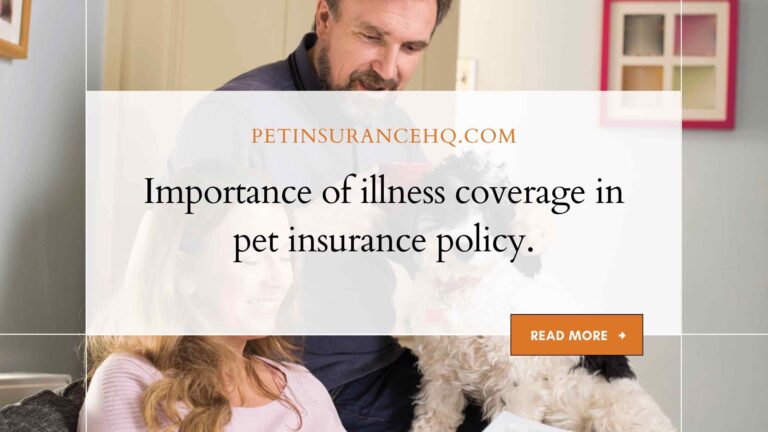The impact of diet and nutrition on pet health and illness coverage
As a pet owner, you want nothing more than to ensure your furry companion lives a long and healthy life. One of the key factors that play an essential role in maintaining your pet’s health is their diet and nutrition. Indeed, what we feed our pets can affect everything from their energy levels and coat condition to their risk of developing chronic diseases or illnesses.
In this blog post, we’ll explore how proper dietary management can influence your pet’s overall well-being and provide tips on ensuring adequate coverage for any potential medical expenses related to issues resulting from poor diet choices. So grab a cup of tea (or coffee) as we take a deep dive into all things pet health!
Introduction to Pet Health and Nutrition
As a pet owner, it’s important to be aware of the role that diet and nutrition plays in your pet’s overall health and well-being. Just like humans, pets need a balanced diet to stay healthy and prevent illnesses. Unfortunately, many pet owners are not aware of the nutritional needs of their animals, which can lead to unhealthy diets and ultimately, higher medical bills.
There are a few things to keep in mind when it comes to your pet’s diet and nutrition. First, make sure you are feeding them a high-quality food that is appropriate for their age, breed, and activity level. Second, pay attention to portion sizes – overfeeding your pet can lead to obesity and all of the health problems that come along with it. Don’t forget about water! Pets need plenty of fresh water every day to stay hydrated.
By following these simple tips, you can help ensure that your pet stays happy and healthy for years to come.
The Benefits of a Balanced Diet for Pets

A balanced diet is essential for all pets, regardless of age, breed, or activity level. Not only does it provide the nutrients needed for growth, development, and repair, but it also helps to keep pets healthy and prevent disease.
There are many benefits to feeding a balanced diet to pets. Perhaps the most important is that it can help to prolong their life by keeping them healthy and active into old age. A well-nourished pet is also less likely to develop obesity, which can lead to a range of health problems including joint pain, diabetes, and respiratory difficulties.
A diet that is rich in antioxidants can also help to protect pets from cell damage and reduce the risk of developing cancer. Antioxidants are found in a variety of foods including fruits, vegetables, whole grains, and certain oils. They work by scavenging harmful toxins known as free radicals that can damage cells and DNA.
In addition to the physical benefits, a healthy diet can also improve pets’ mental wellbeing. Just like humans, pets require certain nutrients for brain function and central nervous system health. Those who eat a nutritious diet tend to be more alert and interactive than those who do not, making them more enjoyable companions overall.
So whatever type of pet you have, be sure to feed them a diet that meets their specific needs in order to give them the best chance at a long and happy life with you!
Common Nutrients and Minerals Essential for Pet Health
There are a variety of nutrients and minerals that are essential for pet health. Pets require different amounts of these nutrients depending on their age, activity level, and overall health. However, there are some common nutrients and minerals that all pets need in order to stay healthy.
One of the most important nutrients for pet health is protein. Protein is essential for building and repairing tissue, as well as for producing enzymes and hormones. Pets need a high-quality source of protein in their diet, such as meat, poultry, fish, or eggs.
Another important nutrient for pet health is fat. Fat provides energy and helps to absorb certain vitamins and minerals. It is also necessary for healthy skin and coat. Pets need a balance of omega-3 and omega-6 fatty acids in their diet to stay healthy.
Carbohydrates are another important nutrient for pet health. Carbohydrates provide energy and help to maintain proper blood sugar levels. They also promote a healthy digestive system. Pets need complex carbohydrates such as whole grains, vegetables, and fruits in their diet.
A variety of vitamins and minerals are also essential for pet health. Vitamins A, D, E, and K are all fat-soluble vitamins that are necessary for proper growth, development, and metabolism. Minerals such as iron, zinc, copper, iodine, selenium, and calcium are also essential for pet health.
Foods to Avoid on a Pet Diet
There are a few types of food that should be avoided when feeding your pet. These include:
- Fatty foods: Fatty foods can increase the risk of pancreatitis, an inflammation of the pancreas. This is a serious condition that can lead to death.
- Chocolate: Chocolate contains theobromine, which is toxic to dogs and cats. Even small amounts can cause vomiting and diarrhea, and larger amounts can lead to more serious problems such as seizures and heart attacks.
- Grapes and raisins: Grapes and raisins can cause kidney failure in dogs. Cats are less susceptible, but it’s best to avoid giving them these fruits just in case.
- Onions and garlic: Onions and garlic contain thiosulphate, which can damage red blood cells and cause anemia. Pets who consume large quantities of onions or garlic may require a blood transfusion.
- Sugar: Many pet owners are unaware of the amount of sugar in everyday foods and treats. Sugar can cause weight gain, dental problems, and diabetes in pets.
How to Choose Nutritional Supplements for Your Pet
When it comes to your pet’s health, diet and nutrition are important factors to consider. Just as with humans, the food your pet eats has an impact on his or her overall health and well-being. Proper nutrition can help prevent or manage many common health problems in pets, such as obesity, heart disease, diabetes, joint pain, and more.
There are a variety of nutritional supplements available for pets, and choosing the right one for your furry friend can be overwhelming. Here are a few tips to help you choose the best nutritional supplement for your pet:
- Work with your veterinarian. Before starting your pet on any type of supplement, it’s important to consult with your veterinarian. They can help you determine if a supplement is necessary based on your pet’s individual health needs.
- Know what you’re looking for. There are many different types of nutritional supplements available for pets, so it’s important to know what you’re looking for before you start shopping around. Are you wanting a supplement that will provide all the nutrients your pet needs? Or are you targeting a specific health concern? Once you know what you’re looking for, narrow down your choices and do some research on the different products available.
- Read the label carefully. Once you’ve decided on a particular supplement, take the time to read the label carefully before giving it to your pet. Make sure that the product is meant for pets and that it meets all of the recommended dos ages and guidelines.
- Look for quality ingredients. When choosing a nutritional supplement, look for one that contains natural, high-quality ingredients with no synthetic fillers or additives. Also, check to make sure the product is manufactured in a facility that is GMP certified (Good Manufacturing Practices).
By following these tips and working closely with your veterinarian, you can choose the best nutritional supplement for your pet and ensure they get all the nutrients they need for optimum health and wellness.
The Role of Exercise in Pet Health and Wellness
Exercise is an important part of keeping your pet healthy and preventing illness. Just like humans, pets need regular exercise to stay fit and to maintain their musculoskeletal and cardiovascular health. Exercise also helps to keep pets at a healthy weight, which can reduce the likelihood of developing obesity-related health problems such as diabetes, joint problems, and respiratory disorders.
In addition to the physical benefits of exercise, pets also benefit from the mental stimulation that comes with being active. Regular exercise can help to alleviate boredom and common behavior problems such as destructiveness, separation anxiety, and aggression. So, not only is exercise good for your pet’s physical health, but it’s also important for their mental well-being.
When choosing an exercise regimen for your pet, it’s important to consider their age, breed, health status, and any preexisting conditions they may have. For example, older pets or those with arthritis may not be able to handle vigorous activity; in these cases, gentle activities such as walking or swimming would be more appropriate. Breeds with short noses (e.g., pugs) are more susceptible to heat stroke and thus shouldn’t be exercised in hot weather or for long periods of time. If your pet has any health concerns, be sure to check with your veterinarian before starting an exercise program.
The Impact of Poor Nutrition on Pet Illnesses and Insurance Coverage
Most people are aware that their own diet and nutrition can impact their health, but did you know that the same is true for your pets? Just like humans, animals require certain nutrients in order to stay healthy and function properly. When pets don’t get the right nutrients, it can lead to all sorts of health problems.
Poor nutrition is one of the most common causes of pet illness. In fact, many pet insurance companies will not cover conditions that are a result of poor nutrition. Some of the most common illnesses caused by poor nutrition include:
- Diabetes
- Heart disease
- Liver disease
- Kidney disease
- Cancer
Pets who are not well-nourished are also more likely to catch diseases and infections. This is because their immune systems are weaker when they’re not getting the nutrients they need. When animals do get sick, poor nutrition can make it harder for them to recover and may even shorten their lifespan.
If you want to keep your pet healthy, it’s important to feed them a nutritious diet. Talk to your veterinarian about what kind of food is best for your pet and make sure you’re giving them the nutrients they need to stay healthy and Happy!
Conclusion
Diet and nutrition play a pivotal role in pet health. Having the right balance of nutrients can ensure that pets remain healthy and active for many years to come; furthermore, it can reduce the risk of developing certain illnesses, saving owners significantly on costly vet bills. Proper diet is especially important for older pets whose bodies are more prone to age-related issues. Owners must take into account their pet’s dietary needs when considering wellness plans or other types of insurance coverage so that they can get the best possible value from their investments.







